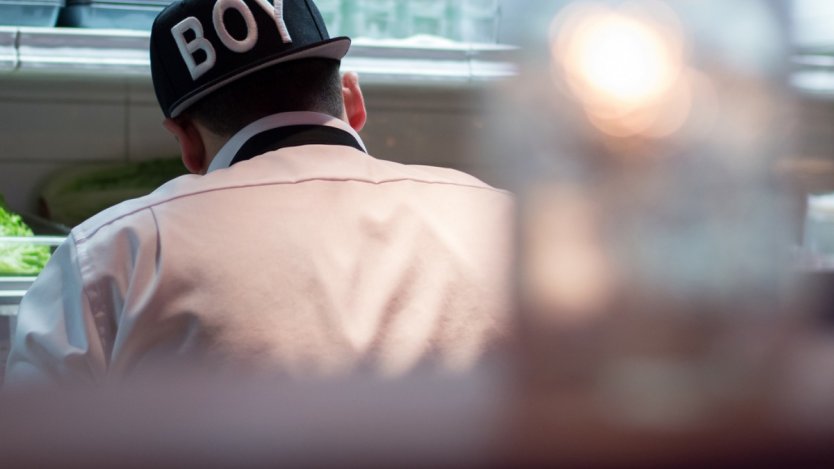I rolled over and looked at the clock-- 8 am. on my day off. Getting up this early on my day off never happens, but I made a commitment to my friend chef Jinhee Lee. I promised I would help her at Gold Medal Plates.
I was already familiar with the competition as I had researched it for a story on Hayato Okamitsu, who had won the competition in 2009. I had attended previous competitions on the media side of things, and I’d like to think I know my way around the kitchen, but I never thought I’d be asked to assist one of the best up-and-coming chefs in the city, much less in a competition as big as Gold Medal Plates.
I had a lot of trepidation leading up to the event as I only had a vague idea of what to expect: I had no idea what Lee was making, nor what role I could be playing.
Preparation prior going to the venue wasn’t overly taxing, or outside of my comfort zone. We ploughed through the crab beignets and gathered all the equipment we’d need for the night in preparing her dish: a cured fish terrine with turmeric butter, taro and crab beignet; an elevated take on the Vietnamese fish dish, the Cha Ca La Vong.
Once at the competition hall, however, tension increased exponentially. Issues popped up, items had to be clarified, timing became tighter, more people had to be coordinated and things became more stressful as we tried keep on schedule and it got closer to the event start time.
I compared this fish-out-of-water experience to my usual day at the office and I couldn’t help but draw parallels in the lessons that the two taught me.
#GMPCalgary podium dishes. pic.twitter.com/ShEhxv5qC2
— Gold Medal Plates (@GoldMedalPlates) November 3, 2016
1. It's a young person's game
Surrounded by chefs half my age, I was acutely aware of the pain surging through my lower back after 700 cycles of hunching over and laying out a thin veneer of cured fish on a set of plates, punctuated with the occasional kneeling and reaching into the dark recess of an ice box to pull out more cured fish.
Seasoned chefs are used to it, but not this usual nine-to-fiver.
I constantly thought of the episode of No Reservations where Bourdain and Ripert return to Les Halles and broke their asses working in the kitchen again. This is hard work, and I should always care for the body as much as the mind.
2. You have to earn the white jacket
I was given a white jacket and an apron so I could blend in with the rest of the team at the event. Although I may have somewhat looked the part, and was addressed as “chef” by some of the actual cooks and chefs who didn’t know about my media background, that façade soon faded away.
My requests were met with questions, instructions left me somewhat wide eyed, and scrambling. I was clumsy and slow to start, and I destroyed a few pieces of fish by moving too quickly and not carefully enough. I knew then I had to choose the simpler jobs, like moving things around or putting something simple on a plate, and leave the complex stuff to the professionals. This was not the time or place to be messing around.
That white jacket is for people who are paid and trained to execute in a kitchen. I am not one of those people. I am good at other things, and while that doesn’t mean I can’t dabble and experiment, I should play up to my own talents.
3. Working hard is the only way to go
My writing job is usually to eat, drink, and then to tell a story. My day job ranges from helping companies through restructuring to leading the company through litigation and arbitration. Yes, both can be very stressful and demanding.
Even with my diverse experiences in high pressure situations, a certain wave washed over me when I looked up from prepping and saw 700 people who have paid an exorbitant amount of money to be well fed in the next 120 minutes. It’s a wave of fucking terror.
Making sure the delicate terrine doesn’t break apart, keeping the judges’ portions separate and safe, keeping plates clean, keeping them oriented in a certain direction so each plate is identical--each movement must be exact, must be fluid and clean, and must be spot on 700 times.
Being on a team of talented chefs for 12 hours made it clear that shutting your mouth, constant movement, and keeping calm are all key. Above all, do not ever let your team down, and God knows, the almost 40-year-old outsider losing the competition for the team would not have made a very nice story over drinks that night.
If you want respect and people to notice you, put some work into it. No one kicked me in the nuts at the end of the night so I think I did enough to warrant a passing grade in this case.
4. A pat on the back and a beer with your friends is priceless
At the end of the competition, the collective tension around the room dissolved. The teams of chefs, who were often composed of chefs from competing restaurants, who had taken a day off just to help each other out, wandered around hugging each other and trying each other’s dishes. Many sat down together to recount what had just happened, and smiles and laughter often erupted over slugged-back bottles of beer.
If you love your work, but your boss is an insufferable oaf, you will eventually be miserable. Just a little recognition, a little respect from your peers and your seniors on a job well done or a battle well fought, is oft enough to make things right in the world again.
Thirteen hours of preparation, cooking, and plating later, Jinhee Lee stood on the top of the podium. In a few months, she will be off to the finals in Kelowna. B.C., and I hope to God she brings a cadre of chefs who can properly support her as she chases the championship. I’ll cheer her on from somewhere where I’m quite a bit more comfortable: the dining table.













